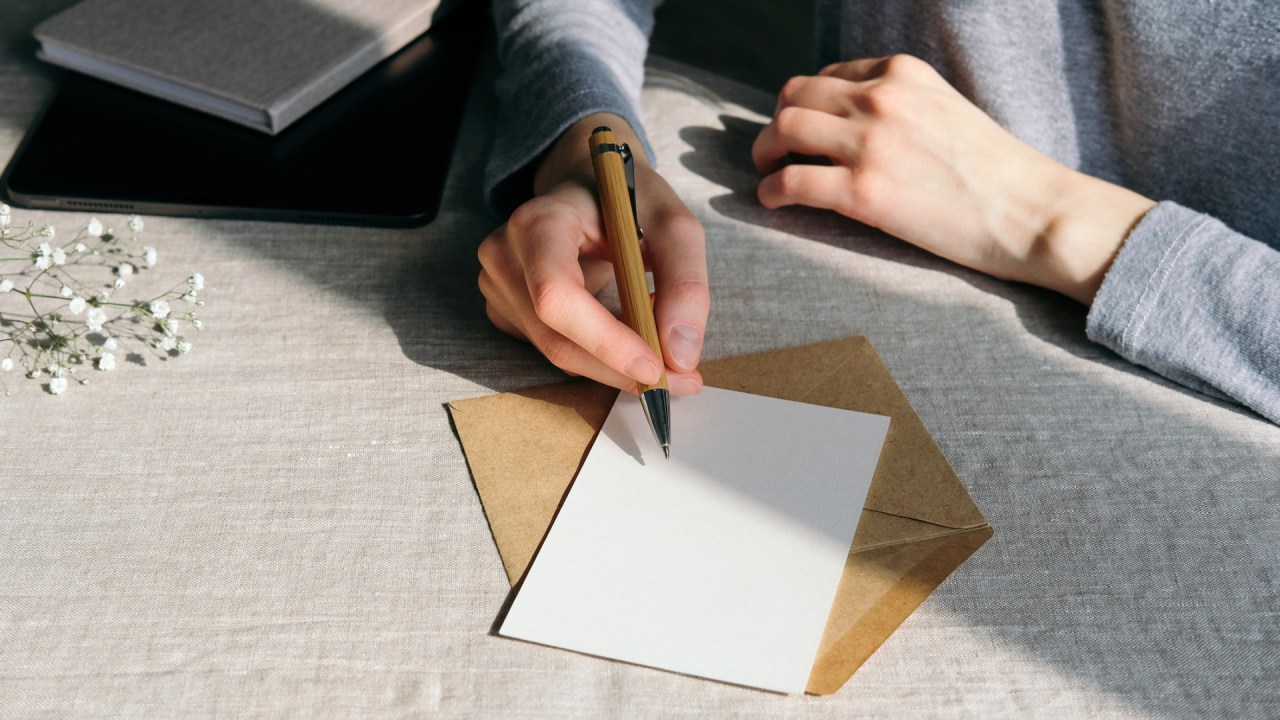My late great-aunt would arrive for Christmas from Edinburgh with a stash of pre-written thank you letters. She’d leave gaps for the specifics of the present and the rest was a scramble of generic, suitably gushing adjectives. The turkey pan would still be soaking and my great-aunt not yet north of the border when you’d be ploughing through her two-sider. My own list of overdue thank you letters – weddings, children’s birthday presents, an impromptu late August BBQ – sit on my to-do list like immovable marker pen, never quite shifted.
Great Aunt Pammie’s clinical efficiency is not something I’ve inherited. But in an age of WhatsApp, there seems to be an absurdity to the paper thank-yous. It’s the impromptu flash of a message the morning after a dinner party glimmering with praise which gives you the smug satisfaction that your slow-cooked ragu was just the ticket, not the dutiful letter which lands through your letterbox after a week of silence. Similarly, the WhatsApped photo of your goddaughter breathless with excitement, fumbling the Polly Pocket you gave her on Christmas morning, is a far greater reward than two lines on a card in January – which has the air of a 1960s school child who’s been made to write lines.
When someone says ‘you mustn’t write’ as they deliver a present, don’t take their word for it
Then there’s the tendency of a letter to relay details to the wedding host which they’re unlikely to have forgotten (‘delicious smoked salmon and rack of lamb, followed by pavlova’). After all, they are the ones who will have shelled out for 150 rounds of it. Or the dangerously dull straying into an inventory of proceedings (‘fantastic brass band, speeches and dancing’).
Writing in the American magazine the Ladies’ Home Journal in February 1894, Mrs Lyman relayed: ‘The “bread and butter” letter as it is sometimes called, because it is supposed to be a letter of thanks for what bread and butter stands for, should be written within 24 hours after arrival at one’s destination, to the hostess whose hospitality one has been enjoying.’
This side of the pond, and 130 years on, time is still of the essence. The longer you leave it the better it needs to be. I recently found my husband desperately googling the history of the Home Counties’ church where his Army friend married in August to bulk out the letter. Had he rattled it off on the Monday after he could have got away with ‘very smart guard of honour on the steps of St Mary’s’ in reference to the church.
And a word of warning: when someone says ‘you mustn’t write’ as they deliver a present or wave you off at the end of an evening, don’t take their word for it. If your host or present giver is a thank you letter proponent, their memory of who has and hasn’t sent one will be terrifyingly encyclopaedic. (And a WhatsApp won’t count.)
There are, of course, exceptions to the tediousness. There are the master letter writers who keep the thank you parts short and use them as a vessel for something much more delicious, a long letter of news and anecdotes which trump any dopamine hit of a flowery WhatsApp message. Or those that are admirably succinct (‘Dear Mr. von Fuehlsdorff: Thank you for your champagne. It arrived, I drank it and I was gayer. Thanks again. My best, Marilyn Monroe’).
It’s here that Debrett’s, which declares ‘thank you notes should always be relentlessly positive and any inconvenience or difficulties associated with the occasion should never be revealed’, is missing a trick. Finding out that you accidentally put your guest next to their disgraced teenage boyfriend at dinner, or that they ripped their dress on the dance floor, is exactly the kind of detail that makes a letter worth reading.
However absurd, there’s a reassuring discipline to the whole charade of the written thank you: the same forces at work that stop you opening 24 advent calendar doors on 1 December or spooning the icing off a birthday cake in one fell swoop. Those hazy days after Christmas when you – and your children, under duress – dutifully tick off thank you letters serve as some sort of calming penance for the preceding days of frothy excess, an excuse to hide with pen and paper.
Keeping track of presents being torn open by three small children simultaneously on Christmas morning, I have found, can feel like a sweat-inducing game of Whac-A-Mole. ‘WHICH CARD CAME OFF THAT ONE,’ you yell as the Lego tumbles, the growing list weighty on your mind. But complete it by the end of the year to start January with an empty thank you inbox – and conscience – and you’ll have a feeling akin to the last day of your GCSEs. Utter freedom.







Comments